全新版大学英语综合教程3教师Unit2PPT课件
大学英语综合教程第三册Unit2课件.ppt
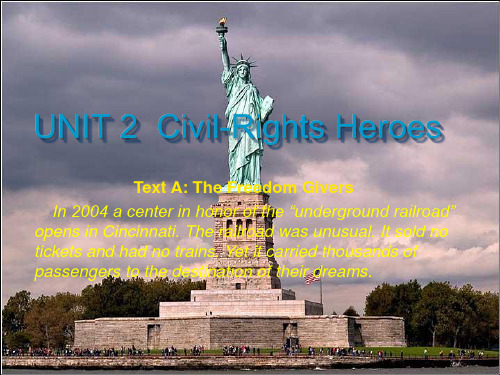
The Civil Rights Movement
(In the US) the national campaign by African-Americans for equal rights, especially in the 1950s and 1960s. The campaign included boycotts (=refusals to buy particular products), the actions of freedom riders, and in 1963 a march to Washington led by Martin Luther King. It succeeded in causing the introduction of bussing and affirmative action. The Civil Rights Act of 1964 and the Voting Rights Act of 1965 were also introduced as a result of the civil rights movement, which has helped to change the attitudes of many white Americans.
Before Reading
1. Background Information 2. Warm-up Questions
And so even though we face the
difficulties of today and tomorrow, I still
have a dream. It is a dream deeply rooted
evident, that all men are created equal."
全新版大学英语综合教程第三册第二单元课文A教学课件

II. Text O verview
标题和作者
详细介绍课文的标题和作者的背景
故事概述
简要概述课文讲述的故事的主要情节和要点
III. Vocabulary
重要词汇和短语
列出并解释与课文相关的关键词汇和短语
定义和示例
给出这些词汇和短语的定义和使用例子
练习题
提供练习题,帮助学生掌握和应用这些词汇和短语
IV. C o m p rehensio n Q uestio ns
1 测验问题
准备一些问题,检验学生对课文的理解程度
2 故事讨论
引导学生就课文展开深入的讨论和思考
V. Literary Analysis
1
主题分析
探究课文中的主题和隐含意义
2
人物分析
对课文中的角色进行细致分析,了解他们的特点和发展
VI. Writing Activities
写作提示
提供一些建议和提示,激发学生的写作灵感
同伴评审活动
安排学生进行相互评审的活动,提供反馈和建议
VII. Further Learning
推荐阅读和资源
介绍与课文相关的其他阅读材料和学习资源
最后的思考和结论
概括本单元课文的重点,并提供第二单元课文A教 学课件
本课件提供了全新版大学英语综合教程第三册第二单元课文A的教学资源。通 过丰富的内容和独特的布局,我们将带您深入了解这一主题,并提供实用的 学习材料和练习。
I. Introduction
- 背景信息:介绍文本相关的背景和历史背景 - 本课程的目标:阐明学习此课文的目的和理由
全新版大学英语综合教程3unit2
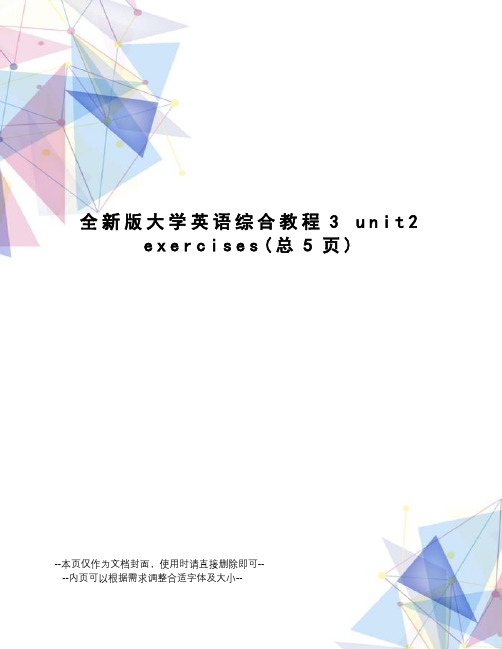
全新版大学英语综合教程3u n i t2e x e r c i s e s(总5页)--本页仅作为文档封面,使用时请直接删除即可----内页可以根据需求调整合适字体及大小--ExercisesDirections: Fill in the blanks with the words or phrases given below, change the form if necessary. (P44)terminal impose racial convictionbid authorize historic site mission decade on the sideslender make the best of religious close in on web1. China's economic success over the past three has raised the living standards of hundreds of millions of Chinese citizens.2.Citibank(花旗银行) picked the chief executive of Etang. com as its first Chinese customer Thursday to open anaccount at its new branch in the Peace Hotel along Shanghai's fabled waterfront.3.The United States last Wednesday tariffs(关税)ofup to 30 percent on a range of foreign steel imports tohelp protect its domestic(国内的)industry.4.Although he was raised as a Christian, he's not reallyvery .5.You can distinguish between frogs and toads(蟾蜍) inthe following way: frogs have bodies, long limbs, and a smooth skin, and toads have stouter bodies, short limbs, and dry skin.6.From the airplane window I could see a of city streets.7.Aunt Pat smiled at her little niece and her to eat.8.Dr. Rich Hamilton is planning his own World Wide Webon the Internet to provide assistance to anyone who asksfor medical help.9.It is difficult to estimate the number of people doing part-time jobs .10.president has his foreign minister, Mr. Burns, to act asrepresentative to the international conference to be held in Tokyo nextmonth.in telecommunications have meant that it is just as easy toworkfrom a computer at home as it is from a town centeroffice.the new gym is built,you have no option but toexisting buildings which may or may not suit yourimmediaterequirements.Directions: use the verb in brackets to form an appropriatephrasal verb to replace the italicized part of eachsentence .(P45)1.When she was younger, my mother experienced a depression so severe she had to be hospitalized. (go) 2.2. The rest of them used to be really nasty(不友好的)to me,butSusie always defended and supported me. (stand) 3.3.The local government established strict rules and regulations to be4.followed by all soccer fans in the 2002 FIFA World Cup in South5.Korea. (lay)4.Tim was quite unhappy about having to undertakeall the householdchores when his wife went out to work. (take)5. Sterling promised to be in the school library by eight o'clock but itlooks like he’s disappointed us again. (let) 6. My professor suggested that I make use of thedata accumulatedover the years when I work on my project. (draw) 7.The problems we are confronted with belong to twocategories:one is financial, the other is technical. (fall) 8.Children's toy guns now look so real that they canoften be takenfor the real thing. (pass) Rewrite each sentence with the word or phrase in brackets,keeping the same meaning. The first part has been writtenfor you.(P46)1.The Europeans have full confidence that the Americans will not beable to justify their measures to protect the struggling American steelindustry. (confident)The Europeans ___________________________________________ __.2.Joe Klein, staff writer of the New Yorker and a uthor of The Naturalthinks that Clinton is the most talented politician of his generationand the most compelling. (in the eyes of)Clinton is, _____________________________________________.3.There’s not much you can do if people are real ly determined to destroy themselves with drugs.(be intent on)4.There's not much you can do if __________________ _______________.5.A completely different approach to life could res ult from a differentexperience of the world. (forge)A different experience of the world _________________ ____.6.We firmly believe that the cloning(克隆)of human beings is boundto cause many ethical and social problems in the l ong run. (conviction)7.It _____________________________________________.8.Directions: Fill in the blanks with the words given below. (P49)friendly lonely monthly weekly lovelycowardly saintly kindly lively motherly1. Beethoven wasand often unhappy, but in contrast to this, hewrote joyful music,such as his last symphony (交响乐), The Ninth.2. Japanese engineers throughout the company apprecia ted their America-n counterpart(对应的人) George’s expertise and his help.3. The term"wage"is commonly reserved for weekly, and salaryforpayment and both types are covered by the term “pay”.4. With the unanimous(一致的) agreement of our family,we finallyspent $500,000 purchasing abig house with a big garden out the back.5. Those who refused to fight in the war were consideredand were badly treated.6. The boy was rescued by a fisherman, whonursed him back tohealth.7. What we need for this job is someone with a and enquiring mind who will have lots of new ideas.8. She took care of many homeless children in a manner.Translation(p51)1.虽然受到全球金融危机后果的巨大影响,但是我们仍然相信我们能够面对挑战,克服危机。
全新版大学英语综合教程第三册课件

全新版大学英语第三册n川U4EE4EE-Changes in the Way We LivePreparations令1.what do you think of the title? Wh y people want to change their ways they live?咱网各2.what are your life style?Text A令Questions Array 1)why do so many migrant workers movefrom the country to the city?2)why do city people buy apartments or houses in the suburbs,even in thecou ntryside?.3l ln your opinion,which is better,living inthe country or city?Words.:.1.frustrate: Array①discourage使灰JL、eg: 丁he lack of money frustrated him②to prevent sb.'s plans. effortsor attempts from succeeding f坐败。
·区〉 .content①adj( not before noun): happy and satisfied eg: He is quite content with his life. ※ be content to d②v:to make sb. fell happy and satisfied ※c onte n t yoursel f with sth(to do or have sth that is not what you really wante d ,bu t i t's still satisfactory )n:1) a feeling of quite happiness and satisfaction※do sth to your hear t's content(to do sth as much as you want) Array eg: 在暑假,孩子们可以允许尽情的玩耍.2) contents: the things that are inside a box,bag,room or are written in a letter,book etc.容器所装的东西,目录3) the amount of a substance that is contained in sth or the ideas ,fact s,opinions that arecontained in a speech or a piece of writingv t:1)transp o时,a s with a t r uck,car t,etc.21t o pu ll sth. heavy with a continuous,steady movementeg: to haul the logs alongto haul up the fishing netsn: a large amount of goods that has been stolen,or found by the policeeg: The robbers' haul included a very va l uable diamond ring.ue:'t o be expected to happen or arrive at a particularte ieg: When is your baby due?食be due to do sth.eg: The meeting isn't due to start until three.eg: I'm due for a pay rise soon.2)due to:because ofeg: The company's problems are due to a mixture of bad luck and poor managemen t.3)in due course:at some time in the future when it is the right tim e,bu t not beforeeg: 委员会会在适当的时候考虑、你的申请的.令.Improveme n t: an act of improving or å state of eing improvedeg: We need to carry out some improvements to the computer system.食cf: improve(ment) on / improve(ment) inimprove(ment) on :如把两件事作比较,而后发生的比 早发生的好eg: Today's weather is an improment on yesterda y ' improve(ment) in :指某方面好转或改善eg: There has been an i mprovement in the weathe r . 食Your luck improves with the improvement of yourse .令p . supplemen t:v: to add sth.,especially to what you earn or eat ,in order to increase it to anacceptable level食supp l emen t by l withn : ①sth. that you add to sth. else toimprove it or make i t complete②an additional part at the .end of a book ,or a separate part of a newspaper , magazine 增刊eg : the supplement to (of x ) the book令 {/ .spray v: to make a stream of small drops of liquid come out of a small tube or several small holes食spray sb . with st h .spray sth . on / over st h .eg :她把香水喷在身上.n : liquid which is forced out of a special container i Çl very small dropseg: hair spray( spray which you put on you hair to keep it tidy)insect spray(spray used for killing insects )n:a neat pile of things one on top of the otherI+of J eg: a stack of dishesv:to form a neat pile or make things i nto a neat pile eg: Stack the firewood in the back yard.食be stacked witheg: 地上堆满了合子.令 fJ .swamp:v :① to suddenly cover sth . with a lot of wate r , espec i ally in a way that causes damage②( usually passive )to suddenly give sb . a lot of work ,problems etc to deal with食swamp sb with stheg :We 're swamped with telephone calls.n : land that is always very wet or slightly covered with watereg :要走出这片沼泽地是非常困难的.令'O.crawl:v:①t o move along on your hands and knees with your body close to the ground食crawl along /across②to be too pleasant or helpful to sb in authority especially because you want them to help you食crawl to sb③make your skin crawl: if sth or sb makes your skin crawl,you think they are extremely unpleasant eg:The way he looks at her really makes my skin crawl.n:a very slow speed令'O.crawl:v:①t o move along on your hands and knees with your body close to the ground食crawl along /across②to be too pleasant or helpful to sb in authority especially because you want them to help you食crawl to sb③make your skin crawl: if sth or sb makes your skin crawl,you think they are extremely unpleasant eg:The way he looks at her really makes my skin crawl.n:a very slow speed令'O.crawl:v:①t o move along on your hands and knees with your body close to the ground食crawl along /across②to be too pleasant or helpful to sb in authority especially because you want them to help you食crawl to sb③make your skin crawl: if sth or sb makes your skin crawl,you think they are extremely unpleasant eg:The way he looks at her really makes my skin crawl.n:a very slow speed令'O.crawl:v:①t o move along on your hands and knees with your body close to the ground食crawl along /across②to be too pleasant or helpful to sb in authority especially because you want them to help you食crawl to sb③make your skin crawl: if sth or sb makes your skin crawl,you think they are extremely unpleasant eg:The way he looks at her really makes my skin crawl.n:a very slow speed令'O.crawl:v:①t o move along on your hands and knees with your body close to the ground食crawl along /across②to be too pleasant or helpful to sb in authority especially because you want them to help you食crawl to sb③make your skin crawl: if sth or sb makes your skin crawl,you think they are extremely unpleasant eg:The way he looks at her really makes my skin crawl.n:a very slow speed令'O.crawl:v:①t o move along on your hands and knees with your body close to the ground食crawl along /across②to be too pleasant or helpful to sb in authority especially because you want them to help you食crawl to sb③make your skin crawl: if sth or sb makes your skin crawl,you think they are extremely unpleasant eg:The way he looks at her really makes my skin crawl.n:a very slow speed令'O.crawl:v:①t o move along on your hands and knees with your body close to the ground食crawl along /across②to be too pleasant or helpful to sb in authority especially because you want them to help you食crawl to sb③make your skin crawl: if sth or sb makes your skin crawl,you think they are extremely unpleasant eg:The way he looks at her really makes my skin crawl.n:a very slow speed令'O.crawl:v:①t o move along on your hands and knees with your body close to the ground食crawl along /across②to be too pleasant or helpful to sb in authority especially because you want them to help you食crawl to sb③make your skin crawl: if sth or sb makes your skin crawl,you think they are extremely unpleasant eg:The way he looks at her really makes my skin crawl.n:a very slow speed令'O.crawl:v:①t o move along on your hands and knees with your body close to the ground食crawl along /across②to be too pleasant or helpful to sb in authority especially because you want them to help you食crawl to sb③make your skin crawl: if sth or sb makes your skin crawl,you think they are extremely unpleasant eg:The way he looks at her really makes my skin crawl.n:a very slow speed令'O.crawl:v:①t o move along on your hands and knees with your body close to the ground食crawl along /across②to be too pleasant or helpful to sb in authority especially because you want them to help you食crawl to sb③make your skin crawl: if sth or sb makes your skin crawl,you think they are extremely unpleasant eg:The way he looks at her really makes my skin crawl.n:a very slow speed令'O.crawl:v:①t o move along on your hands and knees with your body close to the ground食crawl along /across②to be too pleasant or helpful to sb in authority especially because you want them to help you食crawl to sb③make your skin crawl: if sth or sb makes your skin crawl,you think they are extremely unpleasant eg:The way he looks at her really makes my skin crawl.n:a very slow speed令'O.crawl:v:①t o move along on your hands and knees with your body close to the ground食crawl along /across②to be too pleasant or helpful to sb in authority especially because you want them to help you食crawl to sb③make your skin crawl: if sth or sb makes your skin crawl,you think they are extremely unpleasant eg:The way he looks at her really makes my skin crawl.n:a very slow speed令'O.crawl:v:①t o move along on your hands and knees with your body close to the ground食crawl along /across②to be too pleasant or helpful to sb in authority especially because you want them to help you食crawl to sb③make your skin crawl: if sth or sb makes your skin crawl,you think they are extremely unpleasant eg:The way he looks at her really makes my skin crawl.n:a very slow speed令'O.crawl:v:①t o move along on your hands and knees with your body close to the ground食crawl along /across②to be too pleasant or helpful to sb in authority especially because you want them to help you食crawl to sb③make your skin crawl: if sth or sb makes your skin crawl,you think they are extremely unpleasant eg:The way he looks at her really makes my skin crawl.n:a very slow speed令'O.crawl:v:①t o move along on your hands and knees with your body close to the ground食crawl along /across②to be too pleasant or helpful to sb in authority especially because you want them to help you食crawl to sb③make your skin crawl: if sth or sb makes your skin crawl,you think they are extremely unpleasant eg:The way he looks at her really makes my skin crawl.n:a very slow speed令'O.crawl:v:①t o move along on your hands and knees with your body close to the ground食crawl along /across②to be too pleasant or helpful to sb in authority especially because you want them to help you食crawl to sb③make your skin crawl: if sth or sb makes your skin crawl,you think they are extremely unpleasant eg:The way he looks at her really makes my skin crawl.n:a very slow speed令'O.crawl:v:①t o move along on your hands and knees with your body close to the ground食crawl along /across②to be too pleasant or helpful to sb in authority especially because you want them to help you食crawl to sb③make your skin crawl: if sth or sb makes your skin crawl,you think they are extremely unpleasant eg:The way he looks at her really makes my skin crawl.n:a very slow speed令'O.crawl:v:①t o move along on your hands and knees with your body close to the ground食crawl along /across②to be too pleasant or helpful to sb in authority especially because you want them to help you食crawl to sb③make your skin crawl: if sth or sb makes your skin crawl,you think they are extremely unpleasant eg:The way he looks at her really makes my skin crawl.n:a very slow speed令'O.crawl:v:①t o move along on your hands and knees with your body close to the ground食crawl along /across②to be too pleasant or helpful to sb in authority especially because you want them to help you食crawl to sb③make your skin crawl: if sth or sb makes your skin crawl,you think they are extremely unpleasant eg:The way he looks at her really makes my skin crawl.n:a very slow speed令'O.crawl:v:①t o move along on your hands and knees with your body close to the ground食crawl along /across②to be too pleasant or helpful to sb in authority especially because you want them to help you食crawl to sb③make your skin crawl: if sth or sb makes your skin crawl,you think they are extremely unpleasant eg:The way he looks at her really makes my skin crawl.n:a very slow speed令'O.crawl:v:①t o move along on your hands and knees with your body close to the ground食crawl along /across②to be too pleasant or helpful to sb in authority especially because you want them to help you食crawl to sb③make your skin crawl: if sth or sb makes your skin crawl,you think they are extremely unpleasant eg:The way he looks at her really makes my skin crawl.n:a very slow speed令'O.crawl:v:①t o move along on your hands and knees with your body close to the ground食crawl along /across②to be too pleasant or helpful to sb in authority especially because you want them to help you食crawl to sb③make your skin crawl: if sth or sb makes your skin crawl,you think they are extremely unpleasant eg:The way he looks at her really makes my skin crawl.n:a very slow speed令'O.crawl:v:①t o move along on your hands and knees with your body close to the ground食crawl along /across②to be too pleasant or helpful to sb in authority especially because you want them to help you食crawl to sb③make your skin crawl: if sth or sb makes your skin crawl,you think they are extremely unpleasant eg:The way he looks at her really makes my skin crawl.n:a very slow speed令'O.crawl:v:①t o move along on your hands and knees with your body close to the ground食crawl along /across②to be too pleasant or helpful to sb in authority especially because you want them to help you食crawl to sb③make your skin crawl: if sth or sb makes your skin crawl,you think they are extremely unpleasant eg:The way he looks at her really makes my skin crawl.n:a very slow speed令'O.crawl:v:①t o move along on your hands and knees with your body close to the ground食crawl along /across②to be too pleasant or helpful to sb in authority especially because you want them to help you食crawl to sb③make your skin crawl: if sth or sb makes your skin crawl,you think they are extremely unpleasant eg:The way he looks at her really makes my skin crawl.n:a very slow speed令'O.crawl:v:①t o move along on your hands and knees with your body close to the ground食crawl along /across②to be too pleasant or helpful to sb in authority especially because you want them to help you食crawl to sb③make your skin crawl: if sth or sb makes your skin crawl,you think they are extremely unpleasant eg:The way he looks at her really makes my skin crawl.n:a very slow speed令'O.crawl:v:①t o move along on your hands and knees with your body close to the ground食crawl along /across②to be too pleasant or helpful to sb in authority especially because you want them to help you食crawl to sb③make your skin crawl: if sth or sb makes your skin crawl,you think they are extremely unpleasant eg:The way he looks at her really makes my skin crawl.n:a very slow speed令'O.crawl:v:①t o move along on your hands and knees with your body close to the ground食crawl along /across②to be too pleasant or helpful to sb in authority especially because you want them to help you食crawl to sb③make your skin crawl: if sth or sb makes your skin crawl,you think they are extremely unpleasant eg:The way he looks at her really makes my skin crawl.n:a very slow speed令'O.crawl:v:①t o move along on your hands and knees with your body close to the ground食crawl along /across②to be too pleasant or helpful to sb in authority especially because you want them to help you食crawl to sb③make your skin crawl: if sth or sb makes your skin crawl,you think they are extremely unpleasant eg:The way he looks at her really makes my skin crawl.n:a very slow speed令'O.crawl:v:①t o move along on your hands and knees with your body close to the ground食crawl along /across②to be too pleasant or helpful to sb in authority especially because you want them to help you食crawl to sb③make your skin crawl: if sth or sb makes your skin crawl,you think they are extremely unpleasant eg:The way he looks at her really makes my skin crawl.n:a very slow speed令'O.crawl:v:①t o move along on your hands and knees with your body close to the ground食crawl along /across②to be too pleasant or helpful to sb in authority especially because you want them to help you食crawl to sb③make your skin crawl: if sth or sb makes your skin crawl,you think they are extremely unpleasant eg:The way he looks at her really makes my skin crawl.n:a very slow speed令'O.crawl:v:①t o move along on your hands and knees with your body close to the ground食crawl along /across②to be too pleasant or helpful to sb in authority especially because you want them to help you食crawl to sb③make your skin crawl: if sth or sb makes your skin crawl,you think they are extremely unpleasant eg:The way he looks at her really makes my skin crawl.n:a very slow speed令'O.crawl:v:①t o move along on your hands and knees with your body close to the ground食crawl along /across②to be too pleasant or helpful to sb in authority especially because you want them to help you食crawl to sb③make your skin crawl: if sth or sb makes your skin crawl,you think they are extremely unpleasant eg:The way he looks at her really makes my skin crawl.n:a very slow speed令'O.crawl:v:①t o move along on your hands and knees with your body close to the ground食crawl along /across②to be too pleasant or helpful to sb in authority especially because you want them to help you食crawl to sb③make your skin crawl: if sth or sb makes your skin crawl,you think they are extremely unpleasant eg:The way he looks at her really makes my skin crawl.n:a very slow speed令'O.crawl:v:①t o move along on your hands and knees with your body close to the ground食crawl along /across②to be too pleasant or helpful to sb in authority especially because you want them to help you食crawl to sb③make your skin crawl: if sth or sb makes your skin crawl,you think they are extremely unpleasant eg:The way he looks at her really makes my skin crawl.n:a very slow speed令'O.crawl:v:①t o move along on your hands and knees with your body close to the ground食crawl along /across②to be too pleasant or helpful to sb in authority especially because you want them to help you食crawl to sb③make your skin crawl: if sth or sb makes your skin crawl,you think they are extremely unpleasant eg:The way he looks at her really makes my skin crawl.n:a very slow speed。
全新版大学英语综合教程第三册教案 Unit 2
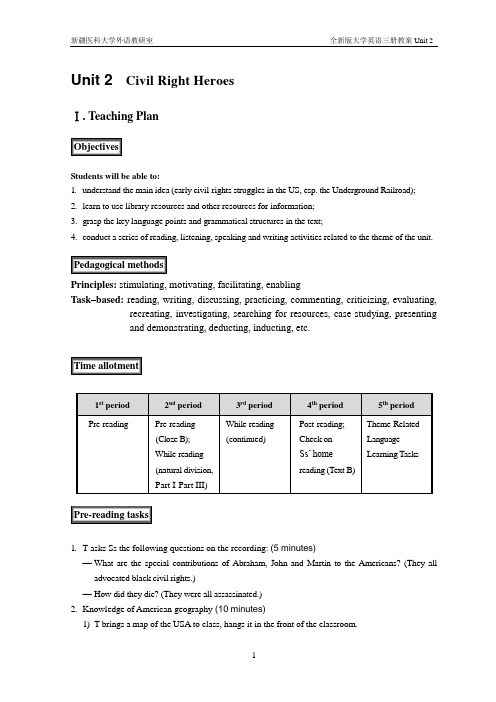
Unit 2Civil Right HeroesⅠ. Teaching PlanStudents will be able to:1.understand the main idea (early civil-rights struggles in the US, esp. the Underground Railroad);2.learn to use library resources and other resources for information;3.grasp the key language points and grammatical structures in the text;4.conduct a series of reading, listening, speaking and writing activities related to the theme of the unit.Principles: stimulating, motivating, facilitating, enablingTask–based: reading, writing, discussing, practicing, commenting, criticizing, evaluating, recreating, investigating, searching for resources, case studying, presentingand demonstrating, deducting, inducting, etc.1. T asks Ss the following questions on the recording: (5 minutes)—What are the special contributions of Abraham, John and Martin to the Americans? (They all advocated black civil rights.)—How did they die? (They were all assassinated.)2. Knowledge of American geography (10 minutes)1)T brings a map of the USA to class, hangs it in the front of the classroom.2)T explains that the USA was divided after the Abolition Act (废除黑奴制法案): the NorthernStates supported it, while the Southern States disapproved of it.3)T circles out the Southern States (Alabama, Arkansas, Florida, Georgia, Louisiana, Mississippi,North Carolina, South Carolina, Tennessee, Texas, and Virginia) and the Deep South states (Alabama, Florida, Georgia, Louisiana, Mississippi, South Carolina and eastern Texas) on the map.4)Ss scan the text to find out all place names (Dresden Ontario, Ripley Ohio, Ohio River, Kentucky,North Carolina, New Port Indiana, Maryland, Cincinnati, Buffalo N.Y., Niagara River) and locate them on the map. T may invite Ss to come up to the map and trace the Hensons’ escape route(i.e., the last section of the text) on it.3. Knowledge of Christianity (10 minutes)1)T explains that, for historical reasons, many black slaves believed in Christianity, like Uncle Tomin Uncle Tom’s Cabin. Therefore, in black writings there are frequent references to Christianity.2)T writes down the following vocabulary items on the blackboard: the Creator, anAfrican-American Moses, Quaker, Bible, Methodist minister, Bethlehem, salvation.3)Ss self-study their meanings by reading the New Words and Expressions and Proper Namessections following the text.4) T checks Ss’ understanding and, if necessary, gives further guidance (see Text Analysis).4.Out-of-class research projects: T guides Ss through Writing Strategy, then tells them to form groupsto research into the discussion questions in Part IV: Theme-Related Language Learning Tasks by using library resources, the Internet and other resources. Each group member may focus on only one discussion question. They will share findings in a later class. (9 minutes)5.Ss do Cloze B to get a better understanding of the Underground Railroad. (15 minutes)1.Ss scan the text to see if there is any natural division between parts of the text. (There is a blank linebetween each part.) (2 minutes)2.T explains the key language points in Part I and gives Ss practice (see Language Study).(10minutes)3.Ss sum up the main idea of this part (see Text Organization Exercise 1),then identify thesentence which connects this part with the following parts, (last sentence in Para 5—“I was intent on telling their stories.”) (3 minutes)4.T explains the key language points in Part II and gives Ss practice (see Language Study).(15minutes)5.Ss sum up the main idea of this part (see Text Organization Exercise 2). (3 minutes)6.T explains the key language points in Part III and gives Ss practice (see Language Study).(151. 1) Ss form groups to discuss the following questions:—Among so many participants of the Underground Railroad, why were John Parker, Levi Coffin and Henson chosen as their representatives? Who do they each represent?—We learn about Henson in Part I, then why is his story delayed until the last part?—Why does the author sometimes quote directly from characters in the stories?(The answers to these questions are discussed below in Text Analysis.)2) Some Ss group report discussion results to class (see Text Analysis). (20 minutes)2.T guides Ss through some after-text exercises. (20 minutes)3.T checks on Ss’ home reading (Text B). (3 minutes)4.Ss do Part IV: Theme-Related Language Learning Tasks by drawing on their out-of-class researchproject. (1 period)5.T asks Ss to prepare the next unit: (2 minutes)1)do the pre-reading task;2)preview Text A.Ⅱ.Text AnalysisWhen we learn a foreign language, we must also learn the culture of the speakers of that language. Text A in this unit is a good case in point. Readers need some basic knowledge of Christianity. Some terms in this text are markedly Christi an, like “Methodist Minister”, “Bible”, “Quaker”. Others refer to characters or places from Biblical stories, such as Moses who led the Jewish people out of slavery in Egypt, or Bethlehem, a holy city for Christians.The author tells three stories about the Underground Railroad and the early Black civil rights movement. The three stories are chosen because they are representative of all participants in this movement: John Parker is a freed slave who later turned into a courageous “conductor”; Levi Coffin is abrave white “conductor”; Josiah Henson is a slave who struggled his way to freedom with the help of the Underground Railroad.We learn about the name of Josiah Henson at the beginning of the text, yet his full story is not told until the last part. In this way the author achieves coherence of text.Direct speech is more convincing than indirect speech, especially when it comes to expressing personal beliefs. For example, the text quotes Levi Coffin saying “The Bible, in bidding us to feed the hungry and clothe the naked, said nothing about color.”On other occasions, direct speech makes a story more vivid. For example, in the John Parker story, characters spoke short sentences to stress the urgency of the situation. For another example, Josiah Henson thre w himself to the ground and shouted to astonished onlookers: “Oh, no! Don’t you know? I’m free!” His joy affects us all.Ⅲ. Cultural Notes1. Freedom and rights: Freedom of the individual is considered one of the essential features of westerncivilization, which is itself sometimes called the Free World. This freedom is often expressed in terms of rights to do certain things or to be treated in a particular way. When a person does something that others think strange, British and American people will often say, “It’s a free country,” meaning that although they disagree with the choice they recognize the other person’s right t o make it.Americans sometimes call the US the “land of the free”, a phrase taken from its national anthem. British people have always strongly defended their freedom. Fear that they will lose the freedom to decide their own future is behind many people’s lack of enthusiasm for European unity.In Britain and the US the most basic rights include freedom of expression ( = freedom to say or write anything), freedom of choice (=freedom to make decisions about your own life) and freedom of worship (=freedom to practice any religion).2. the civil rights movement: (in the US) the national campaign by African-Americans for equal rights,especially in the 1950s and 1960s. The campaign included boycotts ( = refusals to buy particular products), the actions of freedom riders, and in 1963 a march to Washington led by Martin Luther King.It succeeded in causing the introduction of bussing and affirmative action. The Civil Rights Act of 1964 and the V oting Rights Act of 1965 were also introduced as a result of the civil rights movement, which has helped to change the attitudes of many white Americans.3. the Civil Rights Act of 1964: the US law that forced the southern states to allow African-Americansto enter restaurants, hotels, etc. which had been reserved for white people only and to end the practice of having separate areas for black and white people in theatres, train stations, buses, etc. The act was mostly the result of the civil rights movement and was strongly supported by President Lyndon Johnson.It was followed the next year by the V oting Rights Act.4. Uncle Tom’s Cabin: a novel (1852) by the US writer Harriet Beecher Stowe which increased support forthe movement to free slaves. It is about a kind slave called Tom who is badly treated and finally killed by Simon Legree. Tom’s daughter Little Eva also dies, and another well-known character in the novel is the slave child Topsy. The name Uncle Tom is sometimes used as an insult to describe an African-American who has too much respect for white people.5. the Underground Railroad: a secret system used in the US before the Civil War for helpingthousands of slaves to escape to the free northern states or Canada. The slaves were called “passengers”, the people who helped them were “conductors”, and the slaves hid in “stations” (safe houses) along the way.6. Slavery: Slavery played a particularly important role in the history of the US.The first slaves were taken to North America from Africa by the Dutch in 1619. By the time of the American Revolution (1775) there were 500 000 slaves, mostly in the South. After the Revolution the northern states made slavery illegal but the South needed cheap labor for the cotton plantations.Gradually the South’s economy became dependent on slaves and by 1860, the year before the Civil War, there were about 4 million slaves.Conflict between the North and the South increased, and it became clear that supporters and opponents of slavery could not continue to be part of the same country. In 1861 the slave states left the US and formed their own government. This was the beginning of the Civil War.After the North won the Civil War and brought the southern states back into the US, slavery was ended.But little changed for former slaves. Some moved to the North but there were not enough jobs there and many suffered prejudice from Whites. Those that stayed in the South often worked on the plantations where they had been slaves. They were paid for their work, but had to buy food and clothes. Many had to stay there trying to pay off debts which became larger each year.7. Bill Clinton (1946- ): the 42nd US President, elected in 1992 and 1996. He is a Democrat and waspreviously the governor of Arkansas. The US economy improved under Clinton, and the North American Free Trade Agreement has been signed. His successes in helping to achieve world peace include the Camp David Agreement for the Near East and the Dayton Agreement to end the war in Bosnia and Herzegovina. His wife Hillary (1947- ) tried without success to improve the US health system.In 1998 President Clinton admitted that he had had a sexual relationship with Monica Lewinsky, a junior member of the White House staff, after denying it earlier. He was impeached for lying under oath and obstructing justice, but the Senate judged him not guilty.8.Quaker: any member of the Society of Friends, a religious group established in England in the 1650s byGeorge Fox. They were originally called Quakers because members were thought to “quake” or shake with religious excitement. Quakers worship Christ without any formal ceremony or fixed beliefs, and their meetings often involve silent thought or prayer. They are strongly opposed to violence and war, and are active in education and charity work.9.Grand Central Terminal: the best-known railway station in the US. It is on East 42nd Street in New Y orkand was completed in 1913 in the American Beaux Arts style. The main area is very large, and the trainsenter and leave the station on 123 tracks, arranged on two levels. The station is often very crowded: You can’t move in there—it’s like Grand Central Station!10.Methodist: a member of the Methodist Church, the largest of the Protestant Free Churches in Britain andthe US. It was established in 1739 by John Wesley as part of the Church of England but it became separate from it in 1795. It was introduced into the US in the 18th century and today has over 50 million members around the world. It emphasized the importance of moral issues, both personal and social.11.the Deep South: the most southern states of the south-east US: Alabama, Florida, Georgia, Louisiana,Mississippi, South Carolina and eastern Texas. They are among the states that once had slaves and left the Union during the Civil War. They still have racial problems and the people there are mostly conservative in their politics and religion.Ⅳ. Language Study1. slender: (of people) slim; not very wide but comparatively long or highExamples: Although her face was quite plain, she had long, slender expressive hands, like a concert pianist. King crabs have long, slender legs, with a span over 1 meter (3 feet).2. settlement: a place where people have come to settleExamples: Manhattan was the site of the original Dutch settlement of New Amsterdam.These tools were found in an early Iron Age settlement.3. confident:feeling or showing trust in oneself or one’s ability (usu. followed by about/of/that clause)Examples: Michael was confident that he would be enrolled by Harvard University.The more familiar you are with this machine, the more confident you will be about using it.The soccer team is quite confident of being able to win this important game.4. give up: abandon an attempt to do sth.Examples: He’s given up smoking since his illness.The rescue team had given up all hope of finding the two divers alive. She was workingpart-time but she suddenly gave up.5. ironically: it seems ironic (that)Examples: Ironically the widespread use of antibiotics seems to be causing a lot of unexpected health problems.Ironically it is often the poorer people who give the most.6. racial: relating to a person’s race, or to different races of peopleExamples: Slavery is closely associated with racial prejudice, the belief that one race is superior to another.Mandela was elected President in South Africa’s first multi-racial elections, held in 1994.7. stand up (for sb./sth.): speak, work, etc. in favour of sb./sth.; support sb./sth.Examples: You have to be prepared to stand up for the things you believe in.Don’t be afraid to stand up for yourself.8. historic: famous or important in historyExamples: In his book, Churchill recalls that historic first meeting with Roosevelt.More money is needed for the preservation of historic buildings and monuments.Cf: historicalExamples: Historical people, situations, or things existed in the past and are considered to be a part of history.Many historical documents were destroyed when the library was bombed.9. site: place where a building, town, etc. was, is, or will be situatedExamples: The local government h asn’t yet chosen the site for the new skyscraper.There are many archaeological sites in southern England. This monument marks the site ofthe battle.10. mission: particular task or duty undertaken by an individual or a groupExamples: Some delegates were immediately sent to Israel. Their mission was to negotiate a ceasefire.The five young people have been on a mission to help the Cambodians.11. forge: (fig) create by means of much hard workExamples: The two countries agreed to forge closer economic ties.She forged a new career for herself as a singer.12. underground: in or into secrecy or hidingExamples: His mother took him to Hong Kong where she worked in the underground communist movement.For about thirty years the African National Congress (ANC) operated as an undergroundorganization.13. web:network of fine threads spun by a spider or some other spinning creature; complex series ornetworkExamples: The little boy was frightened by the spider’s web in the window.Many commercial and public organizations now have their own Web site and publish a“home page”, giving information about the organization.Every day thousands of web surfers flock to this popular site, posting messages.14. liberate: set freeExamples: The new Afghan government is trying to liberate its people from poverty with international help.The troops’ aim is to liberate the country by the end of the year.15. authorize: give approval or permission for (sth.); give authority toExamples: The central government authorized $200 billion to construct new dams to generate cheap hydro-electric power.The President requested that Congress authorize the presence of US troops in the easternregion.He was obliged by the arguments of the Minister of Labour to authorize a 23 per centgeneral wage increase.16. exploit: brave or adventurous deed or actionExamples: The general’s wartime exploits were later made into a film and a television series.My grandfather entertained us with stories of wartime exploits.17. be intent on doing sth.: be eager and determined to do sth.Examples: Working day and night, Janet seems intent on breaking the record in the Guinness Book of Records.18. peer: look closely or carefully, esp. as if unable to see well (followed by at/through/into, etc.)Examples: Stephen had been peering at a computer printout that made no sense at all.Hawking was a typical grind, underweight and awkward and peering through eyeglasses. 19. decade: period of ten yearsExamples: Many countries were involved in Antarctic exploration during the first decades of the 20th century.Education budgets have been increased over the last decade in China.20. on the side: as an additional job or source of income; secretlyExamples: Some teachers have to find ways of making some money on the side.In order to earn enough money to send his children to school, he makes a little moneyon the side by cleaning windows in his spare time.21. capture: capturing or being capturedExamples: Rebel forces captured the city after a week-long battle.Some of the terrorists who were involved in the 9.11 event were captured by the FBI. 22. close in (on / around): come near to, esp. in order to attack from several directions; surroundExamples: At one time Peter took part in the capture of three thieves.The International Whaling Commission permits the capture of only 400 whales annuallyfor scientific purposes.vt. Examples: Hitler committed suicide as Soviet forces were closing in on Berlin.Right after the suicide explosion, Israeli troops began to close in on the Palestinian city. 23. painful: causing pain; hurtingExamples: Symptoms of pneumonia include painful cough, fever, difficulty in breathing, rapid breathing and chest pain.The old photograph brought back painful memories of his childhood.24. religious: of religionExamples: Daoism (Taoism) is one of the three main Chinese religious and philosophical traditions, the others being Confucianism and Buddhism.The local government wants to increase the amount of religious education in schools.25. conviction: firm opinion or beliefExamples: The old woman had a firm conviction that there would be a better life after death.It is her personal conviction that all corruption should be exposed and dealt with accordingto relevant laws.26. terminal: (building at the) end of a railway line, bus route, etc.; a piece of equipment, usu. consistingof a keyboard and a screen, that connects the user with a computer systemExamples: Most large airports have shops, restaurants, and banks in the terminal building, plus special lounges for departing passengers. All staff have terminals attached to the company’s main computer.27. impose: 1) place a (penalty, tax, etc.) officially on sb./ sth.Examples: The government has made a decision to impose a further tax on wines and spirits.The local government tried to impose fines on the factories which poured untreated wasteinto the river.2) try to make sb. accept (an opinion or a belief)Examples: I wouldn’t want to impose my religious convictions on anyone.It may not be wise for parents to impose their own tastes on their children.28.as for: with regard toExamples: As for your request for a free sample, we will send it to you in about ten days.Some people ha ve complained, but as for me I’m perfectly satisfied with the work ingconditions here.29. transport: take sth. / sb. from one place to another in a vehicleExamples: Reducing the costs of transporting natural resources to production sites is one of the key factors in economic competition.Pipelines are used mainly to transport liquids or gases over long distances.30. disguise: give sb./sth. a false appearance (used in the pattern disguise sb/sth. as)Examples: She disguised herself as a man so she could fight on the battlefield.Jack escaped across the border disguised as a Catholic priest.31. abolish: end the existence of (a law, custom, system, etc.)Examples: Slavery was not finally abolished in the British Empire until 1833.Their mission is to abolish the global fur industry permanently by utilizing appropriate legaland non-violent methods.32. make the best of: accept an unsatisfactory situation cheerfully and try to manage as well as you canExamples: I know it’s cold and raining but we’re here now, so let’s just make the best of it.The living conditions in the village were very poor, but we had to make the best of it.33. compel: make (sb.) do sth.; forceExamples: In the past children were frequently compelled to work from an early age.A large debt burden compelled many developing countries to undertake stabilization andadjustment policies.34. at risk: threatened by the possibility of loss, failure, etc.; in dangerExamples: It is reported that some areas in the west are at high risk of desertification.The buildings in the slum tend to be overcrowded, inadequately served by water and at riskfrom fire.35. starve: (cause a person or an animal to) suffer severely or die from hungerExamples: Some people starved to death during the long drought.Children in the developed countries are living a happy life, while many African childrenare starving.36. in the eyes of: in the opinion ofExamples: In the eyes of his students, Richard is a sensible and reliable teacher.In the eyes of my parent, I am still a young person although I am already in my thirties.37. pass for: appear like; be accepted or looked upon as (same as pass as)Examples: He speaks American English well enough to pass for an American.My younger sister really wants to go and see the film, but I don’t think she’d pass for 18.。
全新版大学英语(第二版)综合教程3教师课件Unit2
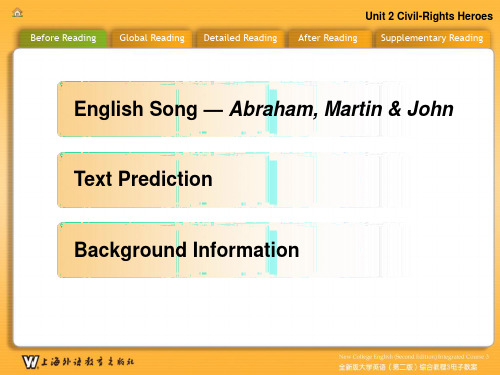
Unit 2 Civil-Rights Heroes
Before Reading Global Reading Detailed Reading After Reading Supplementary Reading
2. John F. Kennedy John Fitzgerald Kennedy was the thirtyfifth president of the US. In his Inaugural Address (就职演说) he said: “Ask not what Detailed Reading your country can do for you — ask what you can do for your country.” As President, he took vigorous action in the cause of equal rights, calling for new civil rights legislation. On November 22, 1963, when he was hardly past his first thousand days in office, John F. Kennedy was killed by an assassin‟s bullets as his motorcade (汽车队) wound through Dallas, Texas. Kennedy was the youngest man elected President; he was the youngest to die.
Unit 2 Civil-Rights Heroes
Before Reading Global Reading Detailed Reading After Reading Supplementary Reading
全新版大学英语综合教程3Unit2
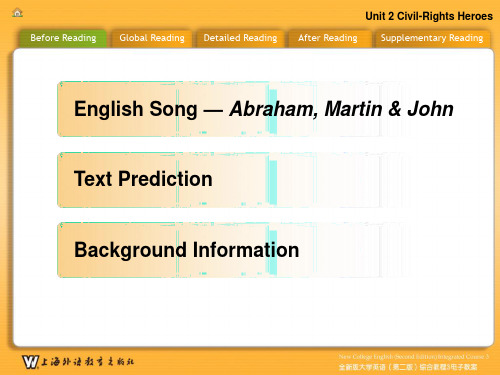
2. Do you know why they all died young? 3. Whom did they free?
Before Reading
Before Reading
Global Reading Detailed Reading After Reading
Global Reading Detailed Reading
Unit 2 Civil-Rights Heroes After Reading Supplementary Reading
Read the Script of the Song Abraham, Martin & John
Has anybody here, Seen my old frienDdetaAilebdrRaeahdiangm? Can you tell me, where he’s gone? He freed a lot of people, But it seems the good they die young, You know, I just looked around, And he’s gone.
He freed a lot of people, But it seems the good they young, I just looked around, And he’s gone. Detailed Reading
Anybody here, Seen my old friend Martin? Can you tell me, where he’s gone? He freed a lot of people, But it seems the good they die young, I just looked around, And he’s gone.
李荫华《全新版大学英语综合教程(3)》(第2版)学习指南【词汇短语+课文精解+全文翻译+练习答案】

李荫华《全新版大学英语综合教程(3)》(第2版)学习指南【词汇短语+课文精解+全文翻译+练习答案】目录Unit 1 一、词汇短语 二、课文精解 三、全文翻译 四、练习答案Unit 2 一、词汇短语 二、课文精解 三、全文翻译 四、练习答案Unit 3 一、词汇短语 二、课文精解 三、全文翻译 四、练习答案Unit 4 一、词汇短语 二、课文精解 三、全文翻译 四、练习答案Unit 5 一、词汇短语 二、课文精解 三、全文翻译 四、练习答案Unit 6 一、词汇短语 二、课文精解 三、全文翻译 四、练习答案Unit 7 一、词汇短语 二、课文精解 三、全文翻译 四、练习答案Unit 8 一、词汇短语 二、课文精解 三、全文翻译 四、练习答案弘博学习网————各类考试资料全收录内容简介本书是《全新版大学英语综合教程(3)》(第2版)的配套辅导用书,按照原教材的课次进行编写,每单元涉及词汇短语、课文精解、全文翻译以及练习答案内容。
词汇短语中精选每单元的重、难点词汇,每个词后除了释义,还给出了相应的例句,及一些常用的搭配、词组、助记方法等。
课文精解从文中选出重点句子及难以理解的句子加以讲解,其中包括对句子结构分析、相关知识点讲解和延伸。
全文翻译是在参阅了大量与教材相关用书的基础上总结编写而成的。
练习答案提供每单元习题的参考答案。
本书旨在帮助学生更好、更高效地学习和掌握教程中的重点及难点知识,具有很强的针对性和实用性。
在编写过程中,该书力求突出重点,答疑难点,语言言简意赅,讲解深入浅出,希望它能得到广大英语学习者的喜爱和认可。
弘博学习网————各类考试资料全收录Unit 1一、词汇短语Text Aget by通过;过得去;过活;获得认可【例句】No one is able to get by without oxygen. 没有氧气人不能维持生命。
frustration [frQs5treiFEn] n. 挫败;挫折;受挫【例句】He ground his teeth (together) in frustration. 他因失败而把牙咬得咯咯响。
综合英语3 unit2 (课堂PPT)

2. Five years later, he returned to the same
home for an overnight visit and resolved to unburden himself by finally telling the woman exactly what had happened to Twinkie. She had just had the guest room prepared and had hung brand-new curtains. To make Uncle feel welcome, she had placed on the bedside table a large pitcher of ice water and a glass, as well as a pen and a bottle of ink, so he could work on his sermon before retiring.
2
Part I Brainstorming
1.Expressions for general impressions of a person:
2.Expressions for Expressions for emotional changes
3.Expressions for beheaviour 4.Expressions for social positions or
5
2.Expressions for Expressions for emotional changes
a. changes for the better: calm, cool, cheer up, feel better, be sympathetic with
全新版大学英语(第二版)综合教程3教师Unit3ppt课件
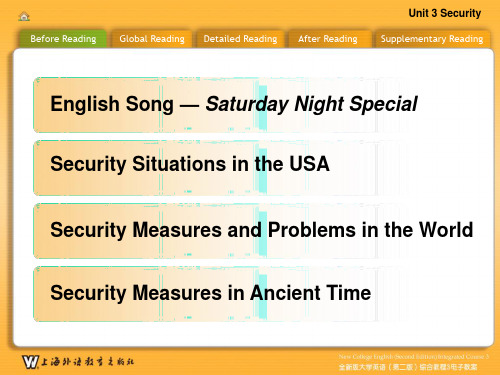
Global Reading Detailed Reading
After Reading
Security Measures and Problems in the World Security Measures in Ancient Time
Before Reading
Global Reading Detailed Reading
After Reading
Unit 3 Security Supplementary Reading
Unit 3 Security Supplementary Reading
Big Jim’s been drinking whiskey Playin’ poler on a losin’ night Pretty soon old Jim starts thinking Somebody’s been _c_h_e_a_ti_n_g_and lying
Big Jim done pulled his pistol Shot his friend right between the eyes
Chorus
Detailed Reading
Oh, Saturday Night Special For twenty _d_o_ll_a_rs_ , you can buy yourself one, too
English Song — Saturday Night Special
Listen to the song and fill in the blanks with what you hear.
Two feets they coDmetaeilead -Rceardeineg pin’ Like a black _c_a_t_ do Two bodies are layin’ naked Creeper thinks he’s got nothing to lose
全新版大学英语综合教程第三册Unit2官方版课件
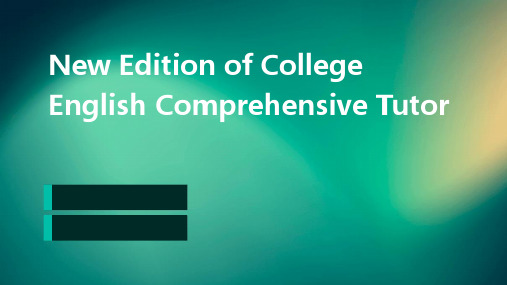
Practical expression explanation
Practical expressions
"I'd like to", "I'm going to", "I've got to"
Explanation
These expressions are used in different contexts to express one's intentions, plans, or obligations. Understanding their usage can help learners express themselves more naturally and accurately in English.
Achievements
John Smith has won numerous awards for his outstanding contributions to the field of English language education, including the "Outstanding Educator Award" and the "Lifetime Achievement Award".
Introduction of the text author
Name
John Smith
Background
John Smith is a well-known English writer and educator, who has published numerous books and articles on English language teaching and learning.
全新版大学英语综合教程课件unit2-Friendship.ppt
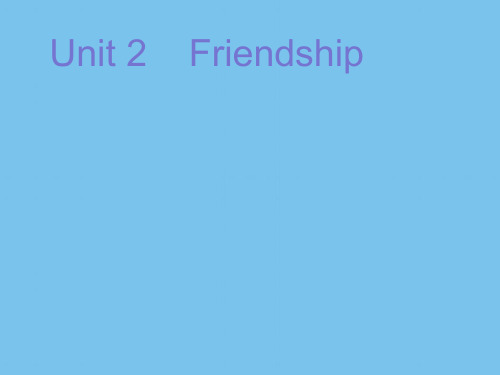
yeah • Wooooh, Wooooh • Yeah Yeah
• You'll always have my shoulder when you cry
• you really mean to me
• Everyday I will
you
• Ohh
remind
• Find out what we're made of
• When we are called to help our friends in need
• You can count on me like 1 2 3 • I'll be there • And I know when I need it I can count on you
• Cause that's what friends are supposed to do, oh yeah
• You can count on me like 1 2 3 • I'll be there • And I know when I need it I can count on you
You'll be there
• Cause that's what friends are yeah
to do, oh
• You can count on me like 1 2 3
• I'll be there
• And I know when I need it I can count on you like 4 3 2
全新版大学英语第三册课件(完整版)

Individual Retirement Account
Individual Retirement Account refers to a US government plan that allows people to put part of their income into special bank accounts. No tax has to be paid on this money until they retire. In fact, “ IRA” is used more often.
Josiah Henson's autobiography, The Life of Josiah Henson, Formerly a Slave, Now an Inhabitant of Canada (1849) is believed to have inspired the title character of Harriet Beecher Stowe's novel, Uncle Tom's Cabin (1852).
Harvard University in Cambridge, Massachusetts
University of Pennsylvania in Philadelphia
Princeton University in Princeton, New Jersey
Yale University in New Haven, Connecticut
全新版 大学英语综合教程第三册课件
Unit 1
Jim Doherty
Background Information
Ivy League
Individual Retirement Account
《全新版大学进阶英语综合教程3》Unit 2教案
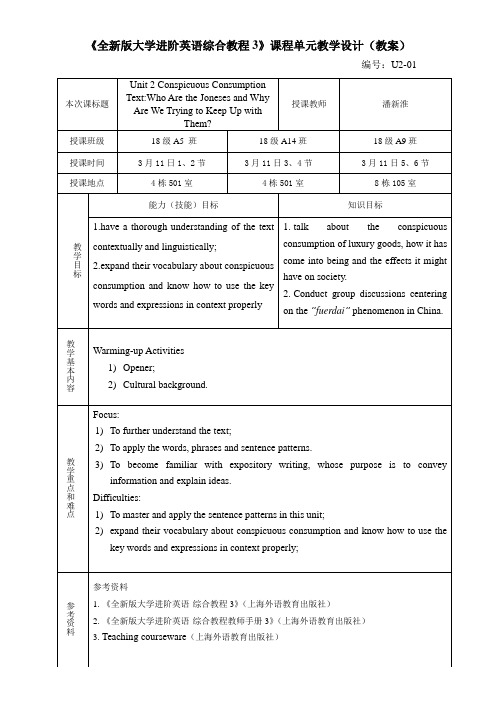
《全新版大学进阶英语综合教程3》课程单元教学设计(教案)编号:U2-01Steps(步骤)教学组织Step One (步骤一)Lead-in:Here is a song that once made Billboard’s Top 5 ‘Hot Country Singles’ (美国Billboard乡村音乐单曲榜TOP 5). Listen to it two or three times, go over the lyrics printed below and fill in the missing words. Then answer the questions that follow. Before you start, reading the culture notes about “keeping up with the Joneses” on page 41 and getting to know the following new words and expressions might be helpful. Keeping up with the JonesesHelpful Expressionsmake the rounds 四处走动fall apart 崩溃;破裂trial n. 审判file /fail/ n. 纵列Notes:1. ’C ause conj. (colloq) = because2. …going out on the town: Here it means they began to goto expensive places they probably couldn’t afford.3. trial: Here it refers to a divorce (离婚) trial in court.4. in single file: one by one, as opposed to hand in hand.“Guess we’ll follow them in single file” implies that we,like the Joneses, will not be a couple anymore.Video watching:Watch the video clip and answer the questions.After watching the video clip, discuss the following questions with your classmates.《全新版大学进阶英语综合教程3》课程单元教学设计(教案)编号:U2-02《全新版大学进阶英语综合教程3》课程单元教学设计(教案)编号:U2-03《新视野大学英语(第三版)》Book 3课程单元教学设计(教案)编号:U2-04。
大学英语综合教程第三册第2课27页PPT

© Zheng Jing, NCEPU,2010-2011
Unit 2, Book 3
❖croak vi. 嗄嗄叫, 发牢骚; vt. 用嘶哑的声音 说; n.蛙或鸦的叫声
❖1. [intransitive]: to make a deep low sound like the sound a frog makes
▪ dread (that)
▪ I'm dreading that I'll be asked to make a speech.
▪ dread the thought/prospect of (doing) something
▪ He dreaded the prospect of beingery grateful to you for taking Tom off at such short notice.
▪ 把窗户摇下来
▪ Wind down the window ▪ 我宁愿与彼得一起得麻疹。
▪ I’d rather have had measles with Peter. ▪ 与某人挥手告别
Unit 2, Book 3
cling to
❖ stick to or hold tightly; stick firmly 紧握.紧抱; hold on 坚持
▪ Cold and hungry, the two lost children clung tightly to each other in the darkness.
❖ vt.关进(鸡舍等), 拘禁: put or shut somebody in a small place, confine, usu. passive: be cooped up: having to stay for a period of time in a place that is too small: ▪ be cooped up in prison ▪ I hate being cooped up in the flat every day. ▪ It is wrong to coop animals up in these tiny cages. ▪ It’s such a tiny office—don’t you ever feel cooped up here? ▪ The jury was cooped up in a hotel during the trial. ▪ It isn’t good for you to be cooped up in the house all day. ▪ He has been cooped up in the house for two days.
全新版大学英语综合教程第三册第二单元课文A教学课件
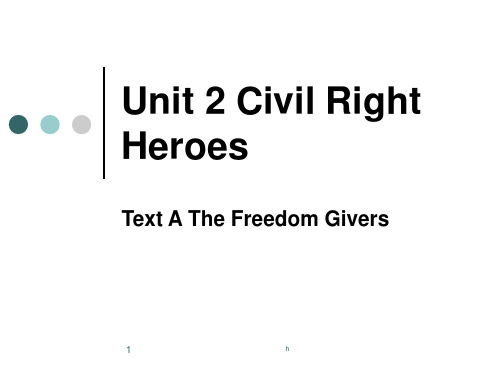
h
9
I Have A Dream (Clipping)
I have a dream that one day this nation will rise up and live out the true meaning of its creed(信条): We hold these truths to be self-evident that all men are created equal. I have a dream that one day on the red hills of Georgia the sons of former slaves and the sons of former slave owners will be able to sit down together at the table of brotherhood. I have a dream that one day even the state of Mississippi, a state sweltering (酷热的) with the heat of injustice, sweltering with the heat of oppression, will be transformed into an oasis (绿洲)of freedom and justice. I have a dream that my four little children will one day live in a nation where they will not be judged by the color of their skin but by the content of their character. I have a dream today! I have a dream that one day, down in Alabama, with its vicious (罪恶 的)racists (种族主义者), with its governor having his lips dripping with the words of interposition (提出异议) and nullification (州对联邦法令的拒绝执行); One day right down in Alabama little black boys and black girls will be able to join hands with little white boys and white girls as sisters and brothers. I have a dream today! ......
- 1、下载文档前请自行甄别文档内容的完整性,平台不提供额外的编辑、内容补充、找答案等附加服务。
- 2、"仅部分预览"的文档,不可在线预览部分如存在完整性等问题,可反馈申请退款(可完整预览的文档不适用该条件!)。
- 3、如文档侵犯您的权益,请联系客服反馈,我们会尽快为您处理(人工客服工作时间:9:00-18:30)。
Global Reading Detailed Reading
Unit 2 Civil-Rights Heroes After Reading Supplementary Reading
Read the Script of the Song Abraham, Martin & John
Has anybody here, Seen my old frienDdetaAilebdrRaeahdiangm? Can you tell me, where he’s gone? He freed a lot of people, But it seems the good they die young, You know, I just looked around, And he’s gone.
Unit 2 Civil-Rights Heroes After Reading Supplementary Reading
Think While Listening
Listen to the song Abraham, Martin & John, sung by Dion, and think about the following questions.
Before Reading
Global Reading Detailed Reading
Unit 2 Civil-Rights Heroes After Reading Supplementary Reading
English Song — Abraham, Martin & John
Detailed Reading
Background Information
Map Reading Detailed Reading
Timeline of Slavery
The Underground Railroad
Uncle Tom’s Cabin
Before Reading
Global Reading Detailed Reading
Before Reading
Global Reading Detailed Reading
பைடு நூலகம்
Unit 2 Civil-Rights Heroes After Reading Supplementary Reading
Didn’t you love the things that they stood for? Didn’t they try to find some good for you and me? And we’ll be free, Someday soon it’Dsetgaiolend nReaadibnge one day ...
Anybody here, Seen my old friend Bobby? Can you tell me, where he’s gone?
I thought I saw him walkin’ up over the hill, With Abraham, Martin and John.
Unit 2 Civil-Rights Heroes
Anybody here, Seen my old friend John? Can you tell me, where he’s gone?
Before Reading
Global Reading Detailed Reading
Unit 2 Civil-Rights Heroes After Reading Supplementary Reading
They are Abraham Lincoln, John F. Kennedy, Martin Luther King and Bobby Kennedy.
2. Do you know why they all died young? 3. Whom did they free?
Before Reading
He freed a lot of people, But it seems the good they young, I just looked around, And he’s gone. Detailed Reading
Anybody here, Seen my old friend Martin? Can you tell me, where he’s gone? He freed a lot of people, But it seems the good they die young, I just looked around, And he’s gone.
Before Reading
Global Reading Detailed Reading After Reading
Text Prediction
Background Information
Before Reading
Global Reading Detailed Reading
Unit 2 Civil-Rights Heroes After Reading Supplementary Reading
English Song — Abraham, Martin & John
Think While Listening Detailed Reading
Read the Script of the Song
People in the Song
Before Reading
Global Reading Detailed Reading
Unit 2 Civil-Rights Heroes After Reading Supplementary Reading
1. A few names are mDeentatilieod nReeaddingin this song. Can you make out who these people are?
Clues: They are all Americans. All died young. They freed a lot of people.
